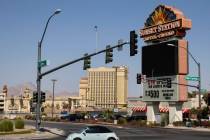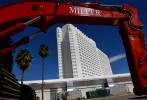Penn National plans split into two separate companies
Penn National Gaming, which saw its stock price jump to nearly a five-year high Friday after announcing plans to split the regional casino operator into two separate publicly traded companies, may be the trendsetter for the rest of the casino industry.
Analysts universally praised Wyomissing, Pa.-based Penn for the move, which separates 17 of the company's 29 casinos and racetracks into a real estate investment trust, often referred to a REIT.
Penn, which began as a Pennsylvania racetrack operator, is best known for its Hollywood-branded casinos.
Penn operates in 19 states and the Canadian province of Ontario. In Nevada, the company owns M Resort in Henderson, which will be placed into the REIT.
Locations not included in the REIT are joint venture properties where Penn owns the gaming side, such as the Hollywood Casino at Kansas Speedway.
Penn National will continue to operate the casinos and the real estate investment trust, which will be spun off to shareholders as the first-ever casino-focused REIT.
If Penn National's split succeeds, J.P. Morgan gaming analyst Joe Greff said other casino companies might explore a similar strategy to would make capital available for other investments.
"This could be a trend within the gaming sector to distribute profits on a more tax efficient basis," Greff told investors after Penn's move was announced late Thursday.
The company hosted a conference with analysts and investors Friday before trading began on the Nasdaq Global Select Market to discuss the restructuring.
"We believe this transaction has positive valuation implications for Penn and the sector more broadly," Greff said.
Stifel Nicolaus Capital Markets gaming analyst Steven Wieczynski said he was somewhat surprised that the first casino REIT came from Penn.
"We were not surprised by the REIT conversion concept, as the idea has been thrown around by various operators over the years," Wieczynski said.
Investors reacted quickly and positively to the announcement, sending shares of Penn up more than 30 percent at one point Friday. The company's stock closed at $48.23, up $10.61, or 28.24 percent. More than 11.2 million shares were traded, almost 18 times the company's average daily volume.
REITs, by law, don't pay federal income taxes. With real estate as the primary source of income, REITs are required to distribute at least 90 percent of their taxable earnings to shareholders as dividends.
Under the announced plans, Penn National investors will receive a dividend of roughly $5.35 a share plus stock in the REIT. The casino operation side will pay the REIT an estimated $450 million a year in rent for the casinos.
Penn Chairman and Chief Executive Officer Peter Carlino will hold the same positions with the REIT and remain chairman of the operating company. Tim Wilmott, Penn's chief operating officer, will become CEO of the casino operation side.
Penn National Chief Financial Officer Bill Clifford said he would retain his position with one of the two separate companies after refinancing Penn's debt next year, including a tendering for Penn's bonds.
The changes are subject to regulatory approval in the states in which the company operates casinos. The split is expected to take place in the second half of next year. The REIT will become effective in January 2014.
During the conference call, Penn National said the Internal Revenue Service provided the company with a "private-letter ruling" concerning the tax treatment. Clifford said the company has completed its work with the IRS and won't require further agency approvals.
Carlino, 66, said splitting Penn into separate companies creates two "well-capitalized" operations positioned to grow in both the gaming and real estate investment markets.
On the conference call, Carlino told investors the split would "unlock the tremendous value of our real estate portfolio."
Carlino said the new ownership structure permits both companies to best address market and growth opportunities in their respective industries.
Analysts said the move could unlock value within the company by lowering the cost of capital and creating fewer regulatory license ownership restrictions.
Carlino said the creation of a casino-specific REIT provides the gaming industry with a new capital funding source.
Credit Suisse gaming analyst Joel Simkins told investors that Penn was returning "substantial capital to shareholders in the form of special and recurring dividends as well as diluted share count reductions."
Carlino said on the conference call the REIT and the operating company will continue to pursue acquisitions and developments. The company will also explore partnerships on projects.
Earlier this month, the company acquired Harrah's St. Louis from Caesars Entertainment Corp. for $610 million and is rebranding the property as Hollywood St. Louis.
Recently, Penn announced plans to apply for a casino project in Iowa and is one of six companies seeking the last casino license in Philadelphia.
In July 2008, Fortress Investment Group and another private equity firm halted a leveraged buyout of Penn National, paying the company a $225 million breakup fee and investing $1.25 billion into the operation.
Fortress, which holds $975 million of the company's preferred shares, agreed to reduce its holdings to help enable the split.
Contact reporter Howard Stutz at hstutz@reviewjournal.com or 702-477-3871.
Follow @howardstutz on Twitter.




























